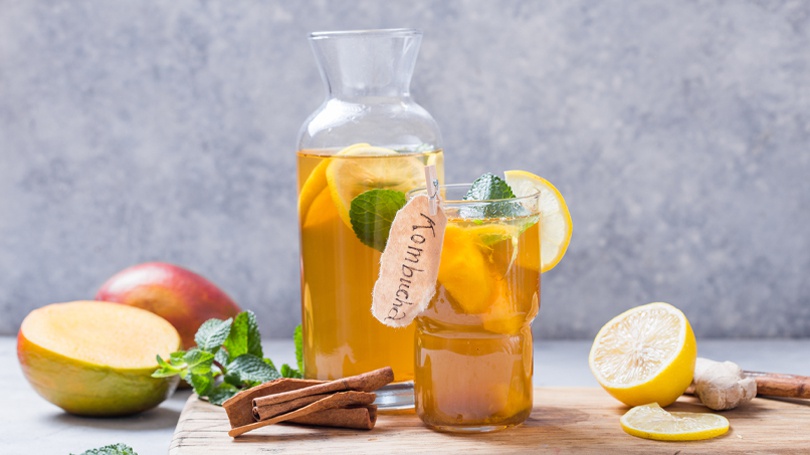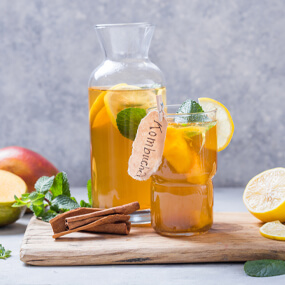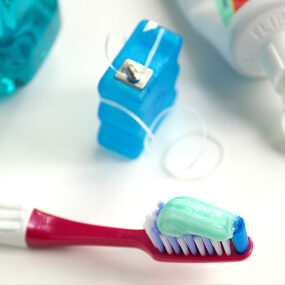How Kombucha Affects Your Tooth Enamel

Kombucha is a health drink that is trending in popularity and is now sold at many coffee shops and similar establishments. The drink hails from the East and is created by fermenting either black or green tea with yeast and bacteria. This process encourages the growth of probiotics, and the drink is then sweetened or otherwise flavored to create a beverage that is healthy but not off-putting.
What Are the Benefits of Kombucha?
In addition to probiotics, kombucha is packed with enzymes and organic acids, and all of these substances are good for your gut microbiome. It aids with digestion and can help to avoid bloating and other side effects after eating. Kombucha is also loaded with antioxidants, which can reduce inflammation. There are also many other supposed health benefits, such as increased energy, mood enhancement, and weight loss. Some of these do have some scientific evidence supporting them, but there is not enough to fully support all of the claims that are out there.
Why Is Kombucha Bad for Oral Health Then?
Through the process of fermentation, the mixture becomes highly acidic. Consider that water has a pH level of 7—which is neutral—tea generally has a pH around 6, and kombucha is below 3.5. That low pH is necessary to avoid harmful bacteria and foster an environment in which the probiotics and other organisms flourish. The problem is that high acid levels are terrible for your teeth. Kombucha can aid in eroding your tooth enamel over time and making you more susceptible to tooth decay.
Tooth Enamel and Acid
Enamel is the hardest tissue in the human body and serves as the outer protective layer of your teeth. Your enamel is under an almost contact attack from the foods you eat and beverages you drink. It does get rebuilt to a degree through a process called remineralization. Fluoride, calcium, and other trace minerals are distributed to your teeth via saliva, and good oral hygiene makes this process more effective by avoiding plaque accumulation and encouraging saliva production. When you drink beverages with high acidic content, those acids attack your enamel directly. Remineralization cannot stave off the effect. Erosion occurs, and eventually, the tooth will begin to decay.
Does That Mean You Should Avoid Kombucha?
You do not necessarily need to stop drinking kombucha. There are plenty of otherwise healthy foods that are bad for your teeth. The important thing is to be aware of them and take measures to mitigate those effects or at least limit your intake. In the case of kombucha and other beverages, you can eliminate the bad effects almost entirely simply by drinking through a straw!
Something else to consider—which applies not just to kombucha but all of the acidic items in your diet—is that you can offset them in meals by pairing them with particular foods. When you eat spaghetti and meatballs or another tomato sauce-heavy dish, for instance, you can balance those acids by having a salad to start and a vegetable like broccoli as a side. Foods in addition to greens that work in this manner include cheese, nuts, eggs, and whole grains. Whenever you enjoy kombucha or another highly acidic food item, rinse your mouth vigorously with water when you are finished, but wait at least 30 minutes before you brush your teeth because brushing too soon can make the acids more effective.
Since kombucha is not really meant to be savored, drinking it through a straw and efficiently as possible should not be a big sacrifice for most. It will also help to avoid the kombucha staining your teeth. If you would like to do more to protect your teeth than rinse with water, consider chewing sugar-free gum.
Take Care With Your Diet
It is important that when your balance and supplement your diet that you keep your oral health in mind. That is not to say that you should not benefit from kombucha and the like, but you should be aware of the risks, make efforts to lessen them, and schedule a regular checkup and cleaning with your dentist. Jeffrey D. Clark, DDS, is a leading dentist who can be an invaluable resource to you regarding your diet. Call Scottsdale Cosmetic Dentistry Excellence at 480 585 1853 to schedule your checkup with Dr. Clark.




